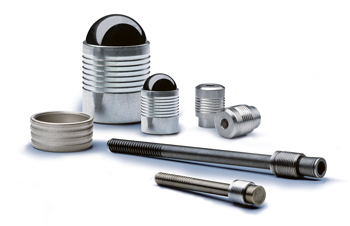Plugs for the Best Metal-to-Metal Sealing
Seals prevent leakage but also have a major effect on safety, performance, lifespan and cost of components, which means that their selection is quite a difficult decision. Koenig Expander® plugs, exclusively distributed in Italy by Bossard Italia, are easy to install and they can be used in a broad range of applications.
by Giorgia Stella
Proper sealing of drilled holes is critical to increase the product safety and duration in every metallic block featuring drilled holes that will have to be fluid tight. When looking for sealing options, it is quite important to consider various aspects, among all leakage tightness and reliability, but also contamination requirements and material compatibility. An appropriate choice of the sealing solution will provide reliable performance, long-life and lower total costs.
Many common metal-to-metal seals – like screws, ball bearings or cup plugs – are no longer suitable for today’s fluid transmission systems. As new materials, hydraulic fluids with unique viscosities, very thin hole wall thicknesses and materials with low elasticity modulus are used more frequently, the right choice of the appropriate sealing solution has become a pretty complex decision.
Tight and reliable sealing due to expansion of the sleeve
Expander® plugs are an increasingly popular option. Their unique design features a sleeve with multiple sealing lines and an internal element, which is a ball or a mandrel. When axial load is applied, the internal element expands the external element, which clings into the hole, ensuring a reliable and secure sealing. Designers can be more confident when choosing a metal-to-metal sealing solution allowing for savings on holes machining and eliminating the use of glue-based or pre-applied sealants. “Koenig Expander® plugs evenly distribute installation stresses”, explains Fabio Locarno, Product Manager for SFC KOENIG expander plugs at Bossard Italia. “The plug is inserted into the channel and then expanded, forming a tight sealing with the base metal. Pull-style plugs eliminate axial forces, while radial forces can be designed according to the type of installation, making them ideal for applications on thin-wall or softer base metals”. Transmission holes can also be difficult to access and housings can be large, which results in complex plug handling and positioning. Many expander plugs uniquely support installation at difficult angles (for instance, oblique holes) without the need for elaborate fixtures. Their design also allows plugs to be easily set within deep channels, thus minimizing air pockets in the devices.
Components with proven sturdiness also in corrosive environments
Different sealing types have different contamination sources. For example, in the case of ball bearings interference press-fit can result in metal debris; as for screw plugs, tapping threads can also cause metal debris; cup plugs and screw plugs often require sealant, which could be applied incorrectly or in excess and then contaminate the lubricating fluid or potentially block the port.
Expander plugs require no additional machining processes (in detail, drilling) or sealant, greatly reducing the risk of contamination.
Many conventional transmission materials, like cast iron, are not compatible with aluminium or other common seal metals, so there is a significant risk for galvanic corrosion between the seal and the base. “Corrosion is an important factor in contamination and sealing failure”, adds Fabio Locarno. “It is why Bossard Italia offers several material types, and why we have performed numerous tests that demonstrate the robustness of our Koenig Expander® plugs in corrosive environments. It is important to consider long-term corrosion factors when choosing your sealing solution”.
Errors, scrap and labour costs are reduced
When comparing piece price of sealing options, cup plugs and ball bearings appear to be less expensive, however Mr Locarno notes that cost evaluation is actually more complex.
“Common seal types often turn out to be more expensive when total costs are calculated. For example, our Koenig Expander® solution requires no additional machining processes and, with its one-piece design, requires no assembly, thus reducing errors, scrap and labour costs. There is also less risk of damage and sealing failure. When total costs are calculated, Koenig Expander® plugs are often not only the most reliable metal-to-metal sealing options available for drilled holes, but they are also extremely cost effective”.

